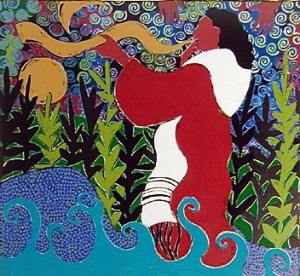 Three years ago when Rachel Azaria tried to run for Jerusalem city counsel she couldn’t even get her campaign picture on city buses. The issue briefly made the news and then disappeared.
Three years ago when Rachel Azaria tried to run for Jerusalem city counsel she couldn’t even get her campaign picture on city buses. The issue briefly made the news and then disappeared.
This fall (Nov, 2011) the Israeli National Transplant Center (ADI) omitted women on bus posters for its Jerusalem organ donor card campaign. But this time when the alarm was raised, the issue didn’t go away. ADI relaunched their ad campaign in Jerusalem, this time with pictures of women. Students and falculty at Jerusalem’s School of Visual Theatre worked together to create posters of headless influential Israeli women and plastered them around town in protest. Israeli Masorti Rabbi Uri Ayalon started a facebook page Uncensored and coordinated with the Jerusalem group Yerushalmim to organize a campaign that showed images of six women in 150 posters across Jerusalem. The New Israel Fundannounced they were collecting pictures of women for their own poster campaign in Jerusalem. The story was covered in places as far flung as Los Angeles, New York, Washington DC, the UK, Australia and even Taipai and Sri Lanka.
When it became clear that part of the reason for the disappearance of women from bus advertisements was lax enforcement of anti-vandalism laws, several groups joined together to petition the Israeli Supreme Court to force the police, the Ministry of Transportation, Egged, and Cnaan Media to display women on bus posters.
In 2006, Miriam Shear was slapped, kicked, punched, and pushed for refusing to move back to the bus, but the story attracted little attention outside of feminist circles. In Novemeber 2011, when Tonya Rosenblitt’s refusal to move to the back of the bus caused a small Haredi demonstration that stopped the bus in its tracks, Israel’s prime minister Benjamin Netanyahu and Tzipi Livni, the opposition leader and even US Secretary of State Hilary Clinton weighed in on the issue.
For years, Puah has held a conference on fertility medicine and halakhah. Women have not been allowed to speak from the dias even when they were the premier expert. The issue never went beyond a local protest. This year it triggered a formal statement by the Israeli Medical Association that declared exclusionary conferences unethical and forbid participation at these conferences.
Why now? What next?
There seem to be two factors at work behind the current attention given the exclusion of women. First, the rabbinic reaction to the decommissioning of 10 soldiers who walked out of an IDF ceremony struck a tender cord with many Israelis. For years, Haredi attitudes towards women have been viewed as a Haredi problem. If secular Israelis got entangled in those issues it was their own fault for venturing into the world of the Haredim. However, nearly every Israeli spends time in the army. There is no escape if the army caves into rabbinic demands and an officer corps that can’t bear to hear or look at a woman develops.
Second, some significant and very effective PR people have finally jumped on board. This is particularly notable in the case of Beit Shemesh and the story of Naama Margolis. The best and most just causes in the world go nowhere without good marketing and public exposure.
However, it should be noted that all of the activism and consciousness raising mentioned above is outside of the government, even when it has the public support of politicians. There is still an on-going government policy of appeasement and accomodation to religious extremism. Even when the government announces its support for anti-exclusion this needs to be taken with a grain of salt. The Israeli government is famous for making public statements to the media and then quietly backtracking on them.
Even though we are a long way away from a Jewish state that fully and consistently stands up for women and the plurality of Jewish views, it is important to stop and note that a significant step forward has been made this fall and winter.
The second week of January City Councillor Rachel Azaria and several other women activists gathered at the Israel Democracy Institute to discuss the current situation. Speaking at the round table of recent events, Azaria said
I felt there were times I needed to pray ‘shehecheyanu’ because something is really changing …I feel we’re at a point where we’re redesigning the rules of the game. The key words are solidarity and responsibility, and I feel we’re going in the right direction.

 RSS
RSS